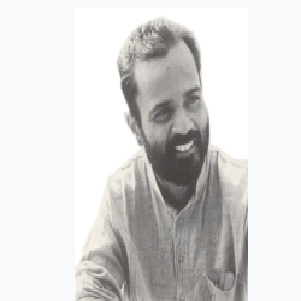Shri. Sanjoy Ghose was an Indian rural development activist known for his pioneering contributions to community health and development media. He set up the URMUL Rural Health and Development Trust — in the desert district of Bikaner in Rajasthan. While working with URMUL, he won the Hubert Humphrey fellowship. After establishing URMUL Rural Health and Development Trust as a mainstream NGO in Rajasthan, he handed over the organisation to a successor, and shifted to Delhi.
Recognizing the potential of writing in mainstream media to highlight rural development issues and catalyse change, Sanjoy conceived of CHARKHA. CHARKHA appears to have been initiated to exploit the legitimate opportunities available in the national media for influencing policies related to rural development.
Through the sponsorship of Association of Voluntary Agencies for Rurul Development, North East (AVARD-NE) Sanjoy and seven colleagues set up base in Majuli island on the Brahmaputra river. The island faced annual flooding and erosion of land. He and his team mobilised around 30,000 human days of voluntary labour (shram dhan). An experimental stretch of 1.7 kilometres of land was protected from erosion, by building embankments: using only local resources and their knowledge. The following year this protected stretch of the island survived the floods. Sanjoy, in this short time, had also diversified the social activities in Majuli: around health (malaria prevention), livelihoods (design, and manufacturing of bamboo and woven products), and education (village libraries).
Read more
Click the link
https://en.wikipedia.org/wiki/Sanjoy_Ghose

Shri. Sanjoy Ghose was an Indian rural development activist known for his pioneering contributions to community health and development media. He set up the URMUL Rural Health and Development Trust — in the desert district of Bikaner in Rajasthan. While working with URMUL, he won the Hubert Humphrey fellowship. After establishing URMUL Rural Health and Development Trust as a mainstream NGO in Rajasthan, he handed over the organisation to a successor, and shifted to Delhi.
Recognizing the potential of writing in mainstream media to highlight rural development issues and catalyse change, Sanjoy conceived of CHARKHA. CHARKHA appears to have been initiated to exploit the legitimate opportunities available in the national media for influencing policies related to rural development.
Through the sponsorship of Association of Voluntary Agencies for Rurul Development, North East (AVARD-NE) Sanjoy and seven colleagues set up base in Majuli island on the Brahmaputra river. The island faced annual flooding and erosion of land. He and his team mobilised around 30,000 human days of voluntary labour (shram dhan). An experimental stretch of 1.7 kilometres of land was protected from erosion, by building embankments: using only local resources and their knowledge. The following year this protected stretch of the island survived the floods. Sanjoy, in this short time, had also diversified the social activities in Majuli: around health (malaria prevention), livelihoods (design, and manufacturing of bamboo and woven products), and education (village libraries).